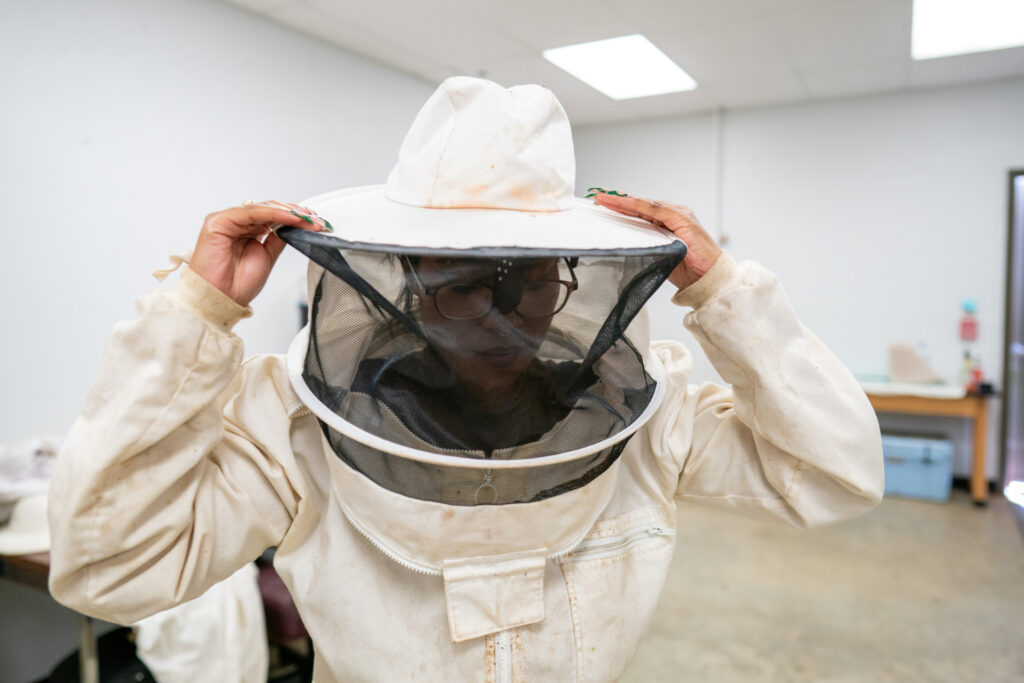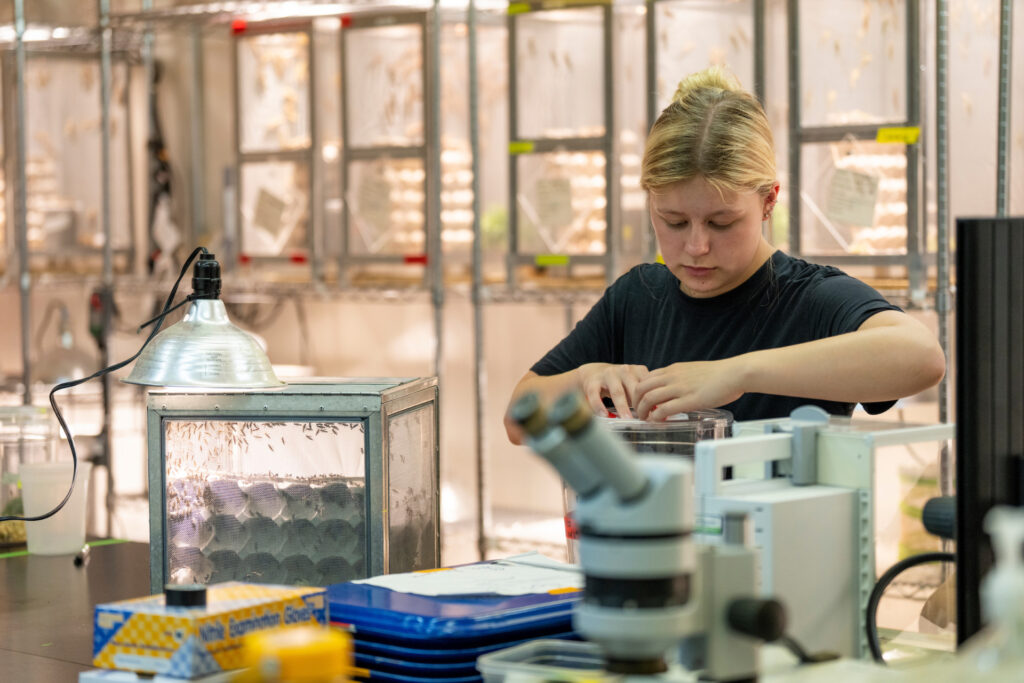Texas A&M entomology student organizations partner to strengthen interest in research opportunities
Provide mentorship, professional development, recruitment to current and prospective students
Research mentorship is a powerful component of the student experience in the Department of Entomology in the Texas A&M College of Agriculture and Life Sciences.
Classroom interaction, hands-on laboratory research experience and the transfer of knowledge that graduate students and undergraduate juniors and seniors usually pass on to younger classmates is more important than ever after two years of COVID-related restrictions.

Students are still catching up on laboratory and interpersonal, collaborative skills that are crucial to their success. Obtaining scholarships and participating in academic and professional organizations, internships and career opportunities were all impacted.
Two of the department’s student organizations have collaborated to help re-engage students with the many undergraduate research projects mentored by faculty, postdoctoral researchers and graduate students.
Helping students reconnect
Founded in 1937, the Undergraduate Entomology Student Organization, UESO, is one of the oldest student organizations on campus. Open to all Texas A&M University undergraduates interested in entomology, regardless of their major, its mission is to further knowledge concerning entomology and for faculty and undergraduate students to work closely together.
“In UESO, students seeking the undergraduate entomology degree have a place to socially connect while they develop into future professionals,” said Phillip Kaufman, Ph.D., professor and head of the Department of Entomology. “It helps them build their network with each other as a cohort and serves as a way for the students who are further in their programs to mentor and advise the freshmen and sophomores who are newer to Texas A&M. And, in our large university, UESO provides a comfort for students with same-shared experiences.”
In total, Texas A&M boasts more than 1,000 student organizations. Regardless of students’ interests, whether academics, recreational activities or simply more social opportunities, the campus has something for everyone. And, for students interested in insects and the field of entomology, the UESO serves as a great connecting point.
“We want to create a fun, inclusive environment for all students interested in insect science, but also this year we wanted to emphasize how monumental research mentorship has been for us as students,” said Mckaela Whilden ’23, UESO president and entomology major.

“Undergraduate students in entomology are required to participate in an internship or research credit, which allows us to work with former students and graduate students who assist in furthering our education,” said Whilden. “Many students outside our department don’t have access to that sort of research opportunity.”
Whilden collaborated with another student organization, Aggie Women in Entomology, AWE, to help develop events to foster mentorship, so undergraduates can learn more about the various research laboratories in the department and how to get involved in the training available to them.
AWE began in 2017 as a graduate-level professional development organization to enhance educational and career success for underrepresented groups, particularly women, in science, technology, engineering and mathematics, STEM, fields. All students who need guidance are welcome to participate in writing sessions, research presentations by invited speakers as well as workshops about how to develop leadership skills, create curriculum vitae and network.
“Post-COVID participation in student organizations for both undergraduate and graduate students has been difficult,” said Lauren Beebe ’19 ’25, president of AWE and doctoral student in the Department of Entomology. Beebe was a founding member of AWE while completing her master’s degree in entomology at Texas A&M.
“It was disappointing that the undergraduate students here during COVID didn’t get the full hands-on laboratory research experience the department offers. When people came back, it took a while for them to really want to be involved in person. So, we wanted to get the word out about what our department is doing, the resources we have and the wide range of exciting careers in entomology.”
Showcasing research and mentorship opportunities
UESO and AWE members organized a mentorship symposium in April for all undergraduates in the department and interested students from other majors. Five undergraduate researchers from various entomology laboratories made presentations about the type of research they conduct and the skills they have gained. After these presentations, all of the attending undergraduate students participated in “table talks” with the faculty and students from 13 different laboratories to learn more about the research projects that interested them.

Beebe said the enthusiastic support from the department was a crucial factor in the event’s success. About 30 faculty members and graduate students were there to support the undergraduate researchers who work in their laboratories and to visit one-on-one with students who wanted to learn more.
Kaufman was impressed with the outcome of the collaboration between UESO and AWE and said the symposium will likely be offered early in future spring semesters so students will have more time to establish relationships and experiences working with professors and other students.
Looking behind the curtain
Ensuring students get mentoring support at multiple levels is a department priority, Kaufman said.
“Students do best when they hear multiple perspectives and learn different skill sets from different individuals,” he said. “I call it looking behind the curtain. If you’re an undergraduate trying to decide what you want to do, having these opportunities to get into the laboratories and learn what a scientist does, what an entomologist does and take ownership of a project can be life-altering.”
Graduate students can include undergraduate students in their research, help teach them proper scientific approaches, laboratory techniques and safety, and give career advice, Kaufman said. The department also has faculty with excellent track records of publishing research with the students, which very few undergraduate students get the chance to do.
Having the chance to look behind the curtain has led some students to find an academic field they didn’t know was possible.
“I started school as a chemistry major, but I’ve always had a passion for honeybees and bee conservation in general,” Whilden said. “So, I took the honeybee biology and beekeeping courses with Dr. Tanya Shepherd and Dr. Juliana Rangel. In those classes, I learned that I could work in insect protection as a research entomologist and be much happier than I would be in a career in chemistry. After taking those classes and beginning undergraduate research, I changed my major.”
Beebe said many people in entomology have come from diverse academic fields and found a common interest in entomology.
“It’s been great to work one-on-one and hold events again,” Beebe said. “Our goal was to encourage undergraduate students to get the most out of their student experience by taking advantage of our exceptional mentorship and research opportunities. And graduate students can take what they’ve learned from their mentor and use those tools to mentor their own students. It can be a rewarding and necessary experience for a career in teaching or running their own lab one day.”


